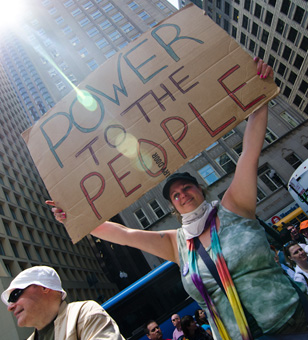Part of the Series
The Whole World Is Watching: NATO in Chicago
“In Chicago,” President Obama said on May 1, “the international community will express support” for a plan to keep soldiers in Afghanistan until 2024, the latest and most extreme in an almost yearly ritual of deadline retreat. The “international community”? Not so fast, President Obama. The polls say something much different.
The 2011 Pew Global Attitudes Project found that majorities or pluralities in 17 out of 22 countries surveyed want US and North Atlantic Treaty Organization (NATO) troops drawn down from Afghanistan as soon as possible. Of the seven countries surveyed that are in NATO, majorities in six, including the United States, want out.
The German Marshall Fund of the United States found last year that only 37 percent of Americans now think it should be the role of this country to establish democracy abroad, down from 52 percent in 2005. Similar to the Pew survey, it also found that a plurality or majority in six of the seven countries sending the most troops to Afghanistan would prefer to have them all withdrawn.
Not surprisingly, Pew found that support for the war is especially low in Muslim countries, from 6 percent in Turkey to 11 percent in Egypt. What’s telling though, is that it seems to be more a referendum on foreign intervention than on al-Qaeda itself. Favorability toward al-Qaeda among Muslims in the Arab world seems to have bottomed out, from a low of 2 percent in Turkey to a high of 21 percent in Egypt. The favorability of both al-Qaeda and NATO powers has hit rock-bottom in the Muslim world.
What people of the Muslim world object to, then, might be a coalition of Western powers bombarding a country like Afghanistan, whose military is outspent by the United States by about 900 to 1 – and the threat that their country might be next. They might also object to the very idea that bombs might deliver anything humanitarian, or that Westerners have something to teach Afghans in their own country.
By 2000, for example, according to UN Office on Drugs and Crime Executive Director Antonio Maria Costa, the Taliban had, “all but eliminated opium poppy cultivation across the Afghan territory under its control.” Now, the UN estimates that Afghanistan produces 92 percent of the world’s opium, keeping some 15 million people addicted worldwide and killing 100,000 annually. Most of the opium money goes to drug lords, warlords and corrupt government officials, instead of to the impoverished farmers who produce it.
“The United States and NATO eight years ago occupied my country under the banner of women’s rights and democracy,” said Malalai Joya to journalist Chris Hedges in 2009. Joya was expelled from the Afghan parliament for denouncing its corruption. “But they have only pushed us from the frying pan into the fire. They put into power men who are photocopies of the Taliban.”
In many ways, Afghanistan is worse off under NATO’s Groundhog Day-like reign of terror than it was before. For more than five years now, Afghan President Hamid Karzai has been pleading for an end to airstrikes, the searching of homes and civilian casualties. “The Afghan people understand that mistakes are made,” he said in October 2007, “But five years on, six years on, definitely, very clearly, they cannot comprehend as to why there is still a need for air power.” Since the time he made that statement, civilian death tolls have risen each consecutive year, for a total of almost 12,000 since 2007.
Civilian deaths have become a hallmark of NATO interventions, in which forces rely on so-called precise aerial campaigns so as not to risk their own soldiers’ lives. Even in the Balkans, NATO’s first and signature so-called “humanitarian war,” it’s estimated that there were thousands of civilian deaths and that tens of billions of dollars worth of damage was done.
“If ancient examples are any good,” wrote Maria Todorova of NATO in “Imagining the Balkans,” “perhaps the most evocative is the behavior of the deities in the Trojan war who followed their own game when tipping the scales without, however, ever pretending they were doing it for the sake of humankind. But they were deities, after all.”
Matching Opportunity Extended: Please support Truthout today!
Our end-of-year fundraiser is over, but our donation matching opportunity has been extended! Today, all donations to Truthout will be matched dollar for dollar. Your one-time gift today will be matched immediately. As well, your monthly donation will be matched for the whole first year, doubling your impact.
This matching gift comes at a critical time. Trump has made it no secret that he is planning a demolition-style attack on both specific communities and democracy as a whole, beginning on his first day in office.
Help us prepare for Trump’s Day One, and have your donation matched today!
